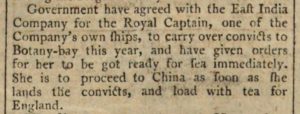[Editor: This brief untitled news item, about the intended use of the ship Royal Captain to transport convicts to Australia, is an extract from the “Postscript: London” section published in the The London Chronicle (London, England), 14 April 1792.]
[Government have agreed with the East India Company]

Source:
The London Chronicle (London, England), vol. LXXI no. 5564, 14 April 1792 [“From Thursday, April 12, to Saturday, April 14, 1792”], p. 360 (8th page of that issue), column 2 [scan #366]
Editor’s notes:
No record could be located of a ship called Royal Captain transporting convicts to Australia. There were at least two other ships named Royal Captain (one was sold for breaking up in 1771, and the other sank in the South China Sea in 1773). However, a Royal Admiral is listed as transporting convicts to Australia. It may be that a ship named Royal Captain was intended to carry out that function, but did not end up fulfilling that role, or the newspaper may have given the wrong name of the ship.
See: 1) “Royal Captain (East Indiaman)”, Wikipedia
2) “494 convict ships sailed to Australia”, Convict Records [a list of ships which transported convicts to Australia]
Botany-bay = (usually spelt: Botany Bay): a bay located to the south of the City of Sydney (New South Wales), located in the south-eastern section of Sydney’s greater metropolitan area; it was discovered in 1770 by the English explorer James Cook (1728-1779); Botany Bay was intended as the location for the first British settlement in Australia, but Governor Arthur Phillip (1738-1814) decided that the area was unsuitable, and instead founded the settlement further north, in Sydney Cove (in Sydney Harbour, Port Jackson, New South Wales), but, despite the change of location, the settlement was often referred to as “Botany Bay” for many years
See: “Botany Bay”, Wikipedia
East India Company = (1600-1873) an English company established with the purpose of carrying out trade with India (in Central Asia), East Asia, and South-east Asia; the company later gained, from the UK parliament, exclusive rights to British trade in their Asian sphere of influence; subsequently, the company became very powerful, establishing its own trading posts, colonies, and armies, and thus became an important part of the British Empire
See: 1) “East India Company: English trading company”, Encyclopaedia Britannica
2) “East India Company”, Wikipedia
Leave a Reply